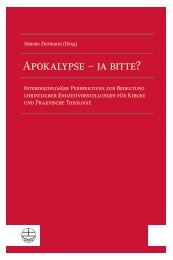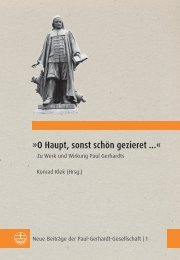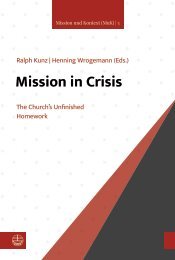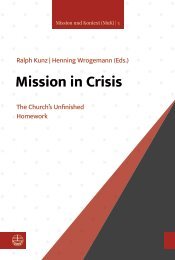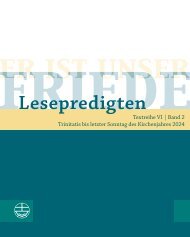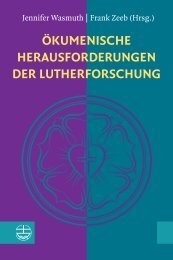Phillip A. Davis, Jr. | Daniel Lanzinger | Matthew Ryan Robinson (Eds.): What Does Theology Do, Actually? (Leseprobe)
Create successful ePaper yourself
Turn your PDF publications into a flip-book with our unique Google optimized e-Paper software.
Introduction 23<br />
Several authors --- from Block to Levine to Athalya Brenner-Idan (Israel / the<br />
Netherlands) --- express concern about political, religious, and social fundamentalisms<br />
that creep in through irresponsible reading practices, illustrating yet<br />
another way in which historical-critical exegesis and present-day contextualization<br />
are seen as inseparable and, in fact, mutually important. Rahandrifenosoa,<br />
Padilla, Manomi, Wandusim, Joy, and Jeremy Punt (South Africa) do not disagree.<br />
One of the important accomplishments of the volume is the way it disrupts<br />
and complicates any unreflected equivocations in opposition between historicalcritical<br />
exegesis and contextual exegesis, liberal West and fundamentalist rest.<br />
Michael Wandusim (Ghana) argues forcefully that the Bible ‘‘will receive increased<br />
critical attention in the times ahead, not necessarily for its own sake, but<br />
due to its documented influence in both religious and secular contexts in Africa.’’<br />
In other words, Wandusim predicts scientific historical-critical exegesis will<br />
continue to gain in importance precisely for the purposes of contextualization<br />
and application, not despite those pressures. For those who are interested, he<br />
also offers a short introduction to several key West African exegetes who represent<br />
the trajectories he is describing in his chapter.<br />
The chapter from Athalya Brenner-Idan offers a particularly fascinating case<br />
study of the outbreak of the Covid-19 pandemic in Israel and responses from<br />
some Ultraorthodox communities. In so doing, she highlights the complex ways<br />
scholarship and religious traditionalism and politics interact as Brenner conducts<br />
a kind of masterclass in historical-critical, theological exegesis of the public<br />
square, while also being very upfront about her positionality and political<br />
leanings as a feminist, secular Jew. On the one hand, as a feminist exegetical<br />
scholar, she represents an approach to ‘‘engaged’’ exegesis; on the other hand,<br />
she does not resist the use of historical-critical methodologies, but rather builds<br />
her argument on historical-critical insights concerning ‘‘plagues’’ and pandemics<br />
in the Bible. Moreover, she seamlessly integrates her feminist lens and historical-critical<br />
insights into a sharp critique of contemporary Israeli politics, not<br />
rooted in but precisely opposing normative theological programs. And how does<br />
she perform this integrated critique? Via the incorporation of discussions of the<br />
Rabbinic period and later Jewish tradition. All of this combined becomes a fascinating<br />
reflection on how complicated and multi-layered are the kinds of things<br />
that exegesis and theology do --- often without it being recognized that they are<br />
present, much less doing anything, at all.<br />
Still, as Jeremy Punt argues, not every scholar will be able to acquire such<br />
expansive area and methodological expertise. Punt suggests therefore that methodological<br />
approaches should not be seen as tools that, properly applied, mechanically<br />
produce correct interpretations, but as ‘‘scientific homes’’ that influence<br />
both interpretations and interpreters. Exegetes thus face the task of<br />
orienting themselves intentionally and responsibly in their own scientific-<br />
(non)credal-civic ‘‘homes’’. Irresponsible exegesis in reaction to a push for easy<br />
answers is an ever-present danger, as Jonathan W. Lo (Hong Kong / Canada)<br />
shows in his chapter on opposing interpretations among Christians in Hong





